Ditapis dengan
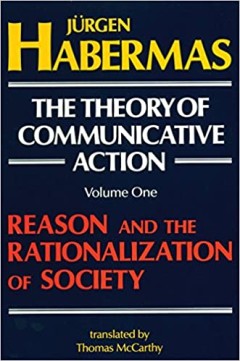
The Theory Of Communicative Action Volume 1: Reason and the Rationalization O…
A major contribution to contemporary social theory. Not only does it provide a compelling critique of some of the main perspectives in 20th century philosophy and social science, but it also presents a systematic synthesis of the many themse which have preoccupied Habermas for thirty years. --Times Literary Supplement
- Edisi
- First Published
- ISBN/ISSN
- -
- Deskripsi Fisik
- xliv + 465 pgs.; 22,5 cm.
- Judul Seri
- -
- No. Panggil
- 301.01 HAB t.1
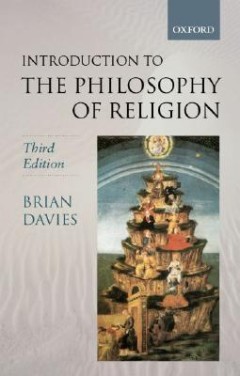
An Introduction To The Philosophy Of Religion
The third edition of An Introduction to the Philosophy of Religion provides a critical examination of some fundamental questions posed by religious belief: What does belief in God amounts to? Can God's existence be proved? Is there life after death? Brian Davies considers these questions and many others, sometimes offering provocative answers of his own, but more often giving readers room to…
- Edisi
- First Published
- ISBN/ISSN
- 0-19-289235-5
- Deskripsi Fisik
- x + 260 pgs.; 23 cm.
- Judul Seri
- -
- No. Panggil
- 200.1 DAV a

Language, Meaning, and God: Essays In Honour Of Herbert McCabe Op
- Edisi
- First Published
- ISBN/ISSN
- 0-225-66495-X
- Deskripsi Fisik
- xii + 243 pgs.; 22,5 cm.
- Judul Seri
- -
- No. Panggil
- 201 LAN l
- Edisi
- First Published
- ISBN/ISSN
- 0-225-66495-X
- Deskripsi Fisik
- xii + 243 pgs.; 22,5 cm.
- Judul Seri
- -
- No. Panggil
- 201 LAN l
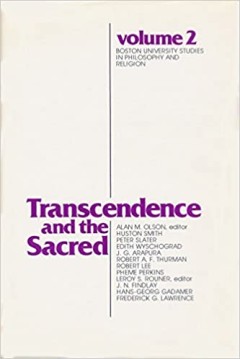
Transcendence And The Sacred Volume 2
A collection of essays on the problems of comparative studies of religions and cultures. Methodology and specific religious cultures are examined.
- Edisi
- First Published
- ISBN/ISSN
- 0-268-01841-3
- Deskripsi Fisik
- xv + 230 pgs.; 23,5 cm.
- Judul Seri
- -
- No. Panggil
- 291 TRA t
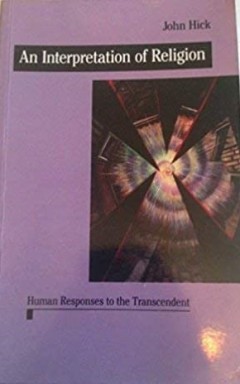
An Interpretation Of Religion
In this classic work, prominent religious philosopher John Hick presents a global interpretation of religion, arguing for a religious response to our ambiguous universe and showing how the world’s different religions are culturally conditioned forms of that response. Praise for the first edition: “This book strengthens Hick’s position as one of the most significant thinkers of the second …
- Edisi
- First Published
- ISBN/ISSN
- 0-333-39488-7
- Deskripsi Fisik
- xv + 412 pgs.; 21,5 cm.
- Judul Seri
- -
- No. Panggil
- 200.1 HIC i

Polemics In Marxist Philosophy
- Edisi
- First Published
- ISBN/ISSN
- 0-913460-63-X
- Deskripsi Fisik
- 245 pgs.; 21 cm.
- Judul Seri
- -
- No. Panggil
- 197 NOV p
- Edisi
- First Published
- ISBN/ISSN
- 0-913460-63-X
- Deskripsi Fisik
- 245 pgs.; 21 cm.
- Judul Seri
- -
- No. Panggil
- 197 NOV p

Existential Technics
With Existential Technics, Don Ihde advances his reflections on the role technology plays in human life. Heretofore primarily the province of Continental thinkers, philosophy of technology is a growing preoccupation of North American philosophers. This collection of essays is a philosophical reflection on and critique of human experience from a clearly American perspective guided by phenomenolo…
- Edisi
- First Published
- ISBN/ISSN
- 0-87395-686-9
- Deskripsi Fisik
- ix + 190 hlm.; 23 cm.
- Judul Seri
- -
- No. Panggil
- 601 IHD e
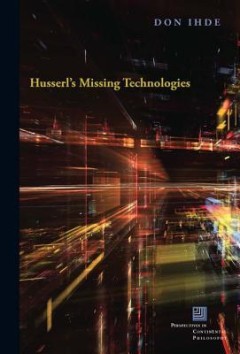
Husserl's Missing Technologies
Husserl's Missing Technologies looks at the early-twentieth-century "classical" phenomenology of Edmund Husserl, both in the light of the philosophy of science of his time, and retrospectively at his philosophy from a contemporary "postphenomenology." Of central interest are his infrequent comments upon technologies and especially scientific instruments such as the telescope and microscope. Tog…
- Edisi
- First Published
- ISBN/ISSN
- 978-0-8232-6961-7
- Deskripsi Fisik
- xviii + 157 pgs.; 20 cm.
- Judul Seri
- -
- No. Panggil
- 193 IHD h
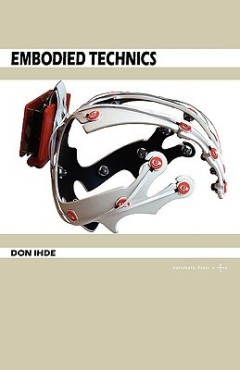
Embodied Technics
While some people think that our new technologies which texture our lifeworld disembody human experience, and while others think that eventually we will be able to 'upload' our very embodiment into these technologies, this collection of chapters takes a close postphenomenological account of a myriad of these technologies as we interface with them. Beginning with cinema and the "Matrix Trilogy,"…
- Edisi
- First Published
- ISBN/ISSN
- 978-87-92130-27-3
- Deskripsi Fisik
- v + 84 pgs.; 21,5 cm.
- Judul Seri
- -
- No. Panggil
- 600 IHD e
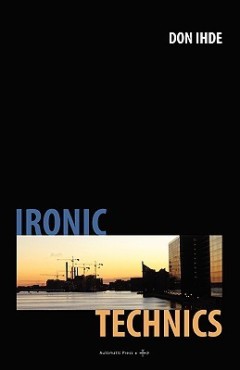
Ironic Technics
Even before we humans became modern as homo sapiens we were busy inventing technologies. But our technologies also invent us as humans. And as we reflect upon this process, too often our interpretations have taken utopian or dystopian directions: our technologies will make life infinitely better and lead us into utopian realms, or our technologies will condemn us to alienation or even destroy o…
- Edisi
- First Published
- ISBN/ISSN
- 978-87-92130-18-1
- Deskripsi Fisik
- vii + 57 pgs.; 21,5 cm.
- Judul Seri
- -
- No. Panggil
- 600 IHD i
 Karya Umum
Karya Umum  Filsafat
Filsafat  Agama
Agama  Ilmu-ilmu Sosial
Ilmu-ilmu Sosial  Bahasa
Bahasa  Ilmu-ilmu Murni
Ilmu-ilmu Murni  Ilmu-ilmu Terapan
Ilmu-ilmu Terapan  Kesenian, Hiburan, dan Olahraga
Kesenian, Hiburan, dan Olahraga  Kesusastraan
Kesusastraan  Geografi dan Sejarah
Geografi dan Sejarah